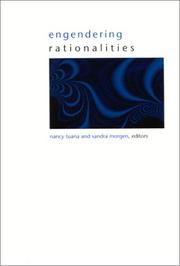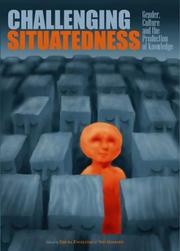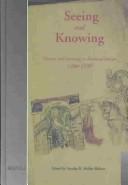| Listing 1 - 3 of 3 |
Sort by
|

ISBN: 0791450864 0791450856 9780791450857 Year: 2001 Publisher: Albany : State University of New York Press,
Abstract | Keywords | Export | Availability | Bookmark
 Loading...
Loading...Choose an application
- Reference Manager
- EndNote
- RefWorks (Direct export to RefWorks)
Knowledge, Sociology of. --- Science --- Sociology of minorities --- Sociology of the family. Sociology of sexuality --- Philosophy --- Sociology of social care --- Theory of knowledge --- Fiction --- Woolf, Virginia --- Feminism --- Latinas --- Literature --- Theory --- Women --- Women's studies --- Care --- Blackness --- Anthology --- Book --- Epistemology --- Feminist theory.

Abstract | Keywords | Export | Availability | Bookmark
 Loading...
Loading...Choose an application
- Reference Manager
- EndNote
- RefWorks (Direct export to RefWorks)
Knowledge, Sociology of. --- Gender identity --- Sociologie de la connaissance --- Identité sexuelle --- Science --- Theory of knowledge --- Social sciences (general) --- Sociology of the family. Sociology of sexuality --- Gender identity. --- Haraway, Donna Jeanne --- Feminism --- Feminist criticism --- Methodology --- Social sciences --- Theory --- Book --- Epistemology

ISBN: 2503514480 9782503514482 9782503526423 Year: 2004 Volume: 11 Publisher: Turnhout, Belgium : Brepols,
Abstract | Keywords | Export | Availability | Bookmark
 Loading...
Loading...Choose an application
- Reference Manager
- EndNote
- RefWorks (Direct export to RefWorks)
The transmission of knowledge in clerical and academic settings of the later Middle Ages has been relatively well studied by traditional scholarship. But successes achieved in other subject-areas by the application of a set of methodologies grouped under the rubric of ‘gender studies’ may offer insights into medieval education. This approach invites a re-examination in gender-political terms of the definition of knowledge by clerical elites and the concomitant rejection from the category of ‘knowledge’ of many varieties of knowledge which did not coincide with their template. The ten articles of this volume focus both on the perennial valorization of the content and methods of clerical/academic education, on the limitation of venues for its transmission to sites from which women were categorically excluded, and, in terms of media for the transmission of knowledge, on the attendant restriction of the techniques and media considered valid for the storage, retrieval, and communication of knowledge to those that were current in these privileged sites.The volume addresses the following issues: what varieties of knowledge were available to communities of women? What kinds of knowledge originated in or became characteristic of women’s communities? What techniques did women develop to preserve and transmit their knowledge? In what ways and with what success was women’s knowledge valorized, both by authors from within these communities and by ‘authoritative’ figures from outside? Under what circumstances could women become authoritative originators of and transmitters of knowledge?
248.2 --- 248-055.2 --- 028-055.2 --- 248.2 Mystieke theologie. Mystiek. Mysticisme --- Mystieke theologie. Mystiek. Mysticisme --- 028-055.2 Vrouwelijke lezers --- Vrouwelijke lezers --- 248-055.2 Vrouwen en spiritualiteit --- Vrouwen en spiritualiteit --- History of Europe --- anno 1200-1499 --- anno 1500-1599 --- Knowledge, Sociology of --- Mysticism --- Scholars, Medieval --- Scholars, Medieval. --- Women intellectuals --- Women mystics --- Women scholars --- History --- History. --- Femmes --- Geschiedenis van de Middeleeuwen --- Geschiedenis van het onderwijs --- Histoire de l'enseignement --- Histoire du Moyen Age --- Vrouwen --- Women --- Intellectuelles --- Savantes --- Mysticisme --- Sociologie de la connaissance --- Education --- Histoire --- anno 500-1499 --- Scholars --- Women in education --- Women specialists --- Mystics --- Intellectuals --- Medieval scholars --- Europe --- To 1500 --- Middle Ages, 600-1500 --- Knowledge [Sociology of ] --- Middle Ages, 500-1500 --- Women intellectuals - Europe - History - To 1500 --- Women scholars - Europe - History - To 1500 --- Women mystics - Europe - History - To 1500 --- Mysticism - History - Middle Ages, 600-1500 --- Knowledge, Sociology of - History - To 1500 --- Scholars, Medieval - History - To 1500 --- Gender --- Religion --- Religious communities --- Writers --- Spirituality --- Book --- Epistemology
| Listing 1 - 3 of 3 |
Sort by
|

 Search
Search Feedback
Feedback About
About Help
Help News
News